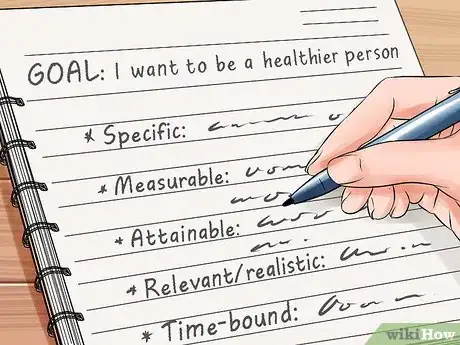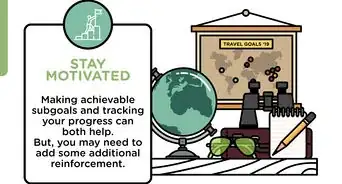This article was co-authored by Kamila Tan. Kamila Tan is a Recovery Coach, former Division I Collegiate Athlete, Inspirational Speaker, and Mental Health Advocate. She is the Founder of Embracing Strength LLC, a coaching business with the mission to provide support for athletes recovering from disordered eating and body image issues and provide support for their families. Kamila informs her work helping athletes pursue recovery with her experience playing beach volleyball as a Division I NCAA collegiate athlete. Kamila holds a Bachelor’s Degree in Psychology and a Master of Public Health from the University of California at Los Angeles, and is currently pursuing her Master of Social Work from the University of Southern California.
There are 16 references cited in this article, which can be found at the bottom of the page.
wikiHow marks an article as reader-approved once it receives enough positive feedback. In this case, 91% of readers who voted found the article helpful, earning it our reader-approved status.
This article has been viewed 328,422 times.
Once you've developed your full potential, it is time to work toward achieving it. It will take planning, time, and effort, but you can do it! Achieving your full potential is about committing yourself to the process of self-improvement, not a single task. Sail your own ocean, and you never know what you might find.
Steps
Setting Yourself up for Success
-
1Define the best version of yourself. At its heart, achieving your full potential is about being the best person that you can be. Since everyone is different, only you can define the terms of success for yourself.[1] Therefore, it is important to know yourself.
- Write down your values, strengths, and weaknesses.[2] [3]
- Is there something I have ever wanted to do/achieve/accomplish, such as dancing, singing, writing, or playing a sport?
- Have I been thinking I could improve in any way, such as being kinder, or politer, more assertive?
- Are there any physical aspects of myself I could work on, such as losing weight, gaining weight, or building muscle?
- Try to define your vocation. Voco in Latin means calling. What is the universe calling you to do? So the first steps are to determine your likes and things that are calling you and things that attract you.[4]
- Follow your dharma. Dharma, on the macro level, means how the universe is operating. On the micro level, it means your relation to the universe. Try to think of things that fill your heart from your soul.[5]
-
2Set goals for yourself. Setting goals is an important part of achieving success.[6] Research shows that setting specific goals helps people get what they want.[7] Take advantage of this fact by setting both short and long term goals for yourself.
- Write down a list of everything you want to achieve.
- Check over your list and seriously consider whether or not it is realistic.
- State your goals positively. Instead of “I want to be less worried about my appearance,” write “I want to be confident about my appearance.”[8]
- Be specific. The more specific you are, the easier it will be to define success.
Advertisement -
3Work toward your goal every day. Once you have confirmed that your goal is achievable and realistic, get to work so it can become a new pattern and process.[9] Your goal may take time to achieve, but you have to begin somewhere.
- Commit to the process. When you focus on the process, rather than the endpoint, you will find it much easier to stay on track. [10]
- Note that your long-term goal does not have to be set in stone, word-for-word. Times will change, people will change, and therefore, your goals will change. It's not an exact science, so you don't need to treat it like one. Allow yourself some room to grow.
- Create a checklist of things you should do every day to work towards your goal. Do those things every day without fail.
Beginning Your Journey
-
1Find your inspiration. It can be a person, a landmark, or your lucky charm. Whatever it is, it will make you smile when you wake up in the morning, and it is the last thing you want to see before you fall asleep at night. Discover what or who it is and treasure it.
-
2Create short-term goals. Breaking your goals into small steps also makes you more likely to achieve them. Achieving short-term goals will help you stay motivated along the way to achieving your long-term goals.[14]
- Write your short-term goals down on a calendar. Use the calendar to hold yourself accountable for achieving your short-term goals.
- In order to get yourself in a mindset for success, make your first few short-term goals easy to attain.[15]
- That being said, once you get going, do challenge yourself. Whenever you feel like something is getting too easy to do, take it up a notch. Once you get in the habit of pushing yourself, it will be easier to continue making progress on your goals.
-
3Be confident. Being confident will help you achieve your goals. Although believing is not enough on its own, negative thoughts will slow you down. The old adage is true: fake it until you make it![16]
- Take care of yourself. Dress well, brush your hair, sit with good posture, and groom regularly.[17]
- Think positively. When you have a negative thought, rephrase it positively.
- Do not compare yourself to others. Instead of dwelling on how you stack up to other people, focus on yourself and your goals.[18] You must determine what your levels of success are, without living by anyone else's standards. Do not let your levels of success be inflicted upon you.[19]
-
4Accept changes as they happen. On the way to developing your full potential, things in your life will change. If you become stuck in your ways, your personal development will stagnate.
- Focus on the things that you can influence and then do them.
- As before, remember you are engaging in a process.
- Adapt to new circumstances by setting new goals.
- Be open to learning new things. [20]
Achieving Your Potential in the Long Term
-
1Accept your failures. Setbacks and failures will happen; they're a natural part of life. Failures are simply a way of showing you what works and what does not. They will help you figure out what you are capable of, and what needs work as you move toward achieving your goal(s).
- Do not take failure personally. Failure to achieve a goal does not mean you are a failure as a person.
- Move on. After you have learned from your failed attempt, let the failure go.
- One way to keep your morale high is to look at any setbacks as learning opportunities. Failing once does not mean you will fail in the future. In fact, having failed, you are now more prepared to succeed the next time.
- Visualize your past successes. This can give you the mental boost you need to get past the stress of your failure.[21]
-
2Get support. Whether you are dealing with addiction, obsession, or any crisis, it helps to have external support. This could mean friends, family, coworkers, or buddies at the gym. You do not have to do it alone.
- Tell someone you see frequently about your goals.
- When the people in your life know about your goals, they can help you achieve them and hold you accountable. Sometimes our willpower fails us, but the people around us can help. [22]
-
3Trust your intuition. Intuition comes from experience and instinct. Although you must be open to change, you should also be willing to trust your own experience and knowledge.
- Trust your experience, but be open to new experiences too.
- Your intuition can help you make better decisions.
- Remember that intuition and contemplation are not mutually exclusive. You can use your intuition to help inform your decision-making process, even when you are not relying on it fully.[23]
- Intuition is a helpful tool for making quick decisions. This can free you up to work on other important goals. You do not need to dwell on every decision, but acting on intuition does not mean making the decision lightly either.
- In your journal, keep a list of the times your intuition helped you. Reference your journal when you are working through a problem.
-
4Never stop. Achieving your full potential is a lifelong process. You will achieve many goals along the way, but always stay committed to the process of self-improvement. Our abilities are not static and fixed.
- Even after you achieve your goals, continue to abide by the checklist you created earlier. This will help you continue to progress even further than you thought you could.
- Failure is not absolute. Samuel Beckett wrote: “Try again. Fail again. Fail better.”[24] Follow this simple premise and you will be able to continue to work toward achieving your full potential.
Expert Q&A
Did you know you can get expert answers for this article?
Unlock expert answers by supporting wikiHow
-
QuestionHow do I get more fulfillment from life?
 Ira IsraelIra Israel is a Licensed Counselor and Psychotherapist who has been in private practice for over 14 years. He specializes in teaching others about happiness and authenticity. Ira teaches sold-out Happiness and Authenticity workshops at Esalen Institute and Kripalu Center and has written over 400 articles on psychology, philosophy, Buddhism, yoga, film, art, music & literature for The Huffington Post, Good Men Project, Mind Body Green, Thrive Global, and Medium. Ira is also the author of How to Survive Your Childhood Now That You’re an Adult: A Path to Authenticity and Awakening. He attended The University of Pennsylvania and has graduate degrees in Psychology, Philosophy, and Religious Studies.
Ira IsraelIra Israel is a Licensed Counselor and Psychotherapist who has been in private practice for over 14 years. He specializes in teaching others about happiness and authenticity. Ira teaches sold-out Happiness and Authenticity workshops at Esalen Institute and Kripalu Center and has written over 400 articles on psychology, philosophy, Buddhism, yoga, film, art, music & literature for The Huffington Post, Good Men Project, Mind Body Green, Thrive Global, and Medium. Ira is also the author of How to Survive Your Childhood Now That You’re an Adult: A Path to Authenticity and Awakening. He attended The University of Pennsylvania and has graduate degrees in Psychology, Philosophy, and Religious Studies.
Licensed Counselor and Psychotherapist
-
QuestionWhy can't I reach my full potential?
 Kamila TanKamila Tan is a Recovery Coach, former Division I Collegiate Athlete, Inspirational Speaker, and Mental Health Advocate. She is the Founder of Embracing Strength LLC, a coaching business with the mission to provide support for athletes recovering from disordered eating and body image issues and provide support for their families. Kamila informs her work helping athletes pursue recovery with her experience playing beach volleyball as a Division I NCAA collegiate athlete. Kamila holds a Bachelor’s Degree in Psychology and a Master of Public Health from the University of California at Los Angeles, and is currently pursuing her Master of Social Work from the University of Southern California.
Kamila TanKamila Tan is a Recovery Coach, former Division I Collegiate Athlete, Inspirational Speaker, and Mental Health Advocate. She is the Founder of Embracing Strength LLC, a coaching business with the mission to provide support for athletes recovering from disordered eating and body image issues and provide support for their families. Kamila informs her work helping athletes pursue recovery with her experience playing beach volleyball as a Division I NCAA collegiate athlete. Kamila holds a Bachelor’s Degree in Psychology and a Master of Public Health from the University of California at Los Angeles, and is currently pursuing her Master of Social Work from the University of Southern California.
Life and Recovery Coach Make sure that you're defining what your full potential looks like for you! Half the battle is simply believing that you can live up to your full potential. The key is identifying what your full potential looks and feels like, mapping it out with goals, and creating patterns around those goals. Soon, you'll be achieving more than you ever thought you could!
Make sure that you're defining what your full potential looks like for you! Half the battle is simply believing that you can live up to your full potential. The key is identifying what your full potential looks and feels like, mapping it out with goals, and creating patterns around those goals. Soon, you'll be achieving more than you ever thought you could!
References
- ↑ Kamila Tan. Life and Recovery Coach. Expert Interview. 24 June 2022.
- ↑ https://hbr.org/2008/07/reaching-your-potential
- ↑ Ira Israel. Licensed Counselor and Psychotherapist. Expert Interview 17 June 2022.
- ↑ Ira Israel. Licensed Counselor and Psychotherapist. Expert Interview 17 June 2022.
- ↑ Ira Israel. Licensed Counselor and Psychotherapist. Expert Interview 17 June 2022.
- ↑ Kamila Tan. Life and Recovery Coach. Expert Interview. 24 June 2022.
- ↑ https://www.psychologytoday.com/blog/notes-self/201308/how-set-goals
- ↑ https://www.psychologytoday.com/blog/notes-self/201308/how-set-goals
- ↑ Kamila Tan. Life and Recovery Coach. Expert Interview. 24 June 2022.
- ↑ https://hbr.org/2011/02/nine-things-successful-people
- ↑ https://www.entrepreneur.com/living/need-inspiration-here-are-9-ways-to-find-it/230064
- ↑ https://www.psychologytoday.com/blog/communication-success/201402/how-unleash-your-creativity-and-find-inspiration-today
- ↑ Ira Israel. Licensed Counselor and Psychotherapist. Expert Interview 17 June 2022.
- ↑ https://www.entrepreneur.com/living/why-our-brains-like-short-term-goals/225356
- ↑ https://www.psychologytoday.com/blog/communication-success/201402/how-unleash-your-creativity-and-find-inspiration-today
- ↑ Ira Israel. Licensed Counselor and Psychotherapist. Expert Interview 17 June 2022.
- ↑ https://www.ncbi.nlm.nih.gov/pmc/articles/PMC4535518/
- ↑ https://kidshealth.org/en/teens/confidence.html
- ↑ Ira Israel. Licensed Counselor and Psychotherapist. Expert Interview 17 June 2022.
- ↑ https://www.linkedin.com/pulse/7-reasons-why-continuous-learning-important-amit-nagpal/
- ↑ https://www.entrepreneur.com/growing-a-business/4-visualization-techniques-that-can-propel-your-success/283241
- ↑ https://extension.psu.edu/using-social-support-to-help-our-healthy-behavior-goals
- ↑ https://www.psychologicalscience.org/news/minds-business/intuition-its-more-than-a-feeling.html
- ↑ Samuel Beckett, Westward Ho! (1983)
About This Article
Once you’ve written down a list of your short-term and long-term goals, hold yourself accountable by telling your friends and family about them. Work towards your goals every day, and move on from your failures by visualizing your past successes. Remember, every setback is a learning opportunity! For more helpful advice from our reviewer, including how to believe in yourself as you work towards your goals, scroll down!










































































